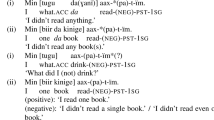Abstract
This paper contrasts two families of approaches to certain affixal verb constructions in Japanese, with particular emphasis on the ’potential’ construction. Scope facts in this construction have been offered as support for complex predicate analyses, in which there is no syntactic constituent consisting of the object and lower verb, to the exclusion of the potential head -rare. We provide a variety of arguments, primarily from aspectual modification properties, which strongly challenge this family of approaches and favor instead VP-complementation approaches in which the potential head selects a thematically complete VP complement. Finally, we show how the scope facts may be accommodated on such a viewpoint, drawing connections to similar properties with other restructuring configurations cross-linguistically.
Similar content being viewed by others
References
Bobaljik J.D., Wurmbrand S. (2005). The domain of agreement. Natural Language and Linguistic Theory, 23, 809–865
Dowty D. (1979). Word meaning and montague grammar. Dordrecht, Reidel
Futagi, Y. (2004). Japanese focus particles at the syntax–semantics interface. Ph.D. Dissertation. New Brunswick, NJ: Rutgers University.
Harada, Y., & Noguchi, N. (1992). On the semantics and pragmatics of dake (and only). In C. Barker, & D. Dowty Eds.), SALT II (pp. 125–144). (Working Papers in Linguistics 40), Columbus: Ohio State University.
Hoshi, H. (1999). Complex predicate formation in Japanese: A (Non-)configurational theory. SOAS Working Papers in Linguistics and Phonetics, 427–473.
Kathol A. (2000). Linear syntax. New York/Oxford, UK, Oxford University Press
Kato, S. (2003). Derivational theta-marking: A minimalist approach to the complex predicate constructions in Japanese. Gengo Kenkyu [Journal of Linguistic Society of Japan] 124, 37–96.
Koizumi, M. (1995). Phrase structure in minimalist syntax. Ph.D. Dissertation, Cambridge, Mass.: MIT.
Manning C., Sag I., Iida M. (1999). The lexical integrity of Japanese causatives. In: Levine R.D., Green G.M. (eds) Studies in contemporary phrase structure grammar. Cambridge, UK, Cambridge University Press, pp. 39-79
Matsumoto Y. (1996). Complex predicates in Japanese: A syntactic and semantic study of the notion ’word’. Stanford, Calif, CSLI Publications
Nomura, M. (2003). The true nature of nominative objects in Japanese. In E. Kaiser, & S. Arunachalam (Eds.), U. Penn Working Papers in Linguistics Proceedings of the 26th Annual Penn Linguistics Colloquium (pp. 169–183). Penn Linguistics Club.
Nomura, M. (2005). Nominative case and AGREE(ment). Ph.D. Dissertation, Storrs: University of Connecticut.
Rooth, M. (1985). Association with Focus. Ph.D. Dissertation, Amherst: University of Massachusetts.
Rothstein, S. D. (2004). Structuring events: A study in the semantics of lexical aspect. Oxford: Blackwell.
Saito, M. (2000). Predicate raising and theta relations. In Proceeding of 2000 Seoul International Conference on Language and Computation (pp. 85–113). The Linguistic Society of Korea.
Saito, M., & Hoshi, H. (1998). Control in Complex Predicates. ms., Nanzan University and SOAS.
Sano M. (1985). LF movement in Japanese. Descriptive and Applied Linguistics, 18, 245–259
Tada H. (1992). Nominative objects in Japanese. Journal of Japanese Linguistics, 14, 91–108
Takano, Y. (2003). Nominative objects in Japanese complex predicate constructions: A prolepsis analysis. Natural Language and Linguistic Theory, 21, 779–834.
Wurmbrand S. (2001). Infinitives: Restructuring and clause structure. Berlin/New York, Mouton de Gruyter
Wurmbrand S. (2004). Two types of restructuring-Lexical vs. functional. Lingua, 114, 991–1014
Wurmbrand, S. (2005). How complex are complex predicates? ms., University of Connecticut, Storrs; to appear in Syntax.
Yokota, K. (2001). Complex-predicate formation and some consequences in Japanese, Abstract for LFG 2001 conference: http://www.hku.hk/linguist/research/Ab_Yokota.htm
Author information
Authors and Affiliations
Corresponding author
Additional information
For discussion of the material presented here, and judgements on examples, we are grateful to Kimiko Nakanishi, Masashi Nomura, Mamoru Saito, Tomokazu Takehisa, Kazuko Yatsushiro, and the JEAL editors and reviewers, as well as the audiences at CLA 2003 (Halifax) and JK-14 (Tucson). Parts of this research were funded by a grant from the Fonds québécois de la recherche sur la société et la culture.
Rights and permissions
About this article
Cite this article
Bobaljik, J.D., Wurmbrand, S. Complex Predicates, Aspect, and Anti-reconstruction. J East Asian Linguist 16, 27–42 (2007). https://doi.org/10.1007/s10831-006-9004-y
Received:
Accepted:
Published:
Issue Date:
DOI: https://doi.org/10.1007/s10831-006-9004-y




